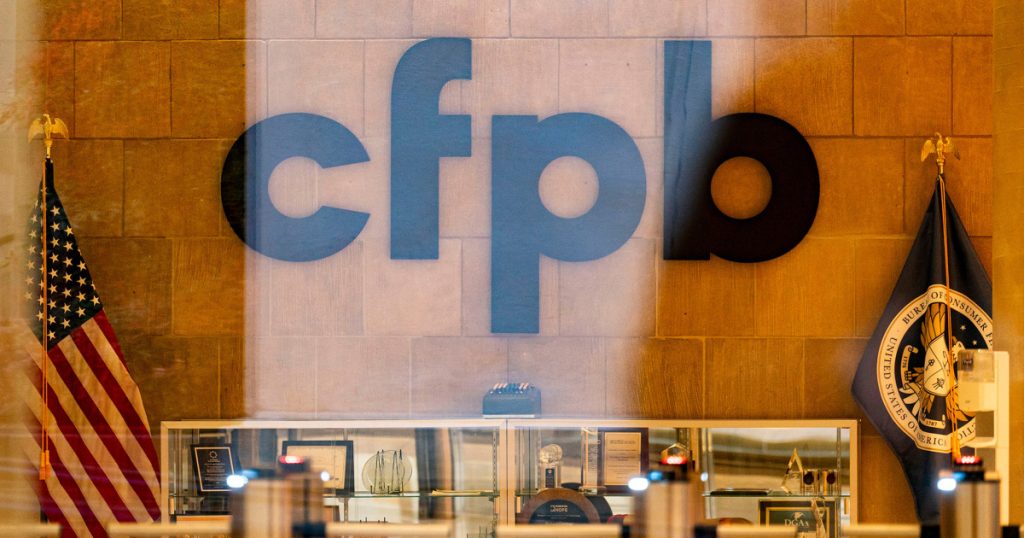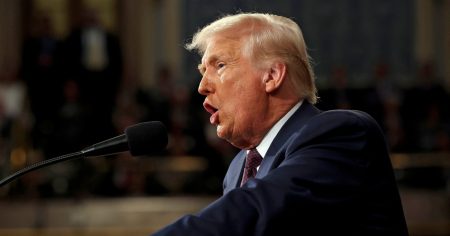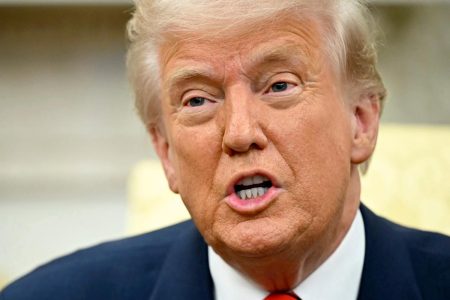The Consumer Financial Protection Bureau (CFPB), a cornerstone of consumer financial protection in the United States, is facing an unprecedented crisis under the Trump administration. Established in 2011 in the aftermath of the 2008 financial crisis, the CFPB was designed to oversee nearly $18 trillion in consumer debt and ensure that financial institutions operate fairly and transparently. However, the Trump administration’s efforts to dismantle the agency have raised concerns among consumer advocates and staffers alike. A CFPB employee, speaking anonymously, revealed that all meetings and work items on their calendar, including critical investigative actions, had been deleted. This has led to fears that the agency’s machinery is on the verge of grinding to a halt, leaving consumers vulnerable to unchecked industry practices. The CFPB’s homepage displayed a “404: Page not found” error on Monday evening, symbolizing the turmoil within the agency. Acting Director Russell Vought has instructed employees to cease most work activities and refrain from reporting to the office for the remainder of the week, further exacerbating the sense of chaos. Vought also announced that the agency will not draw its next round of unappropriated funding, claiming it is not “reasonably necessary” to fulfill its duties. This move has drawn sharp criticism and lawsuits from federal unions, who argue that the administration is systematically undermining the agency’s ability to function.
The CFPB has long been a target of Republican lawmakers and Wall Street critics, who view the agency as an overreach of federal authority. Russell Vought, a key figure in the Trump administration, has been a vocal advocate for abolishing the CFPB altogether, as outlined in Project 2025, a conservative blueprint for Trump’s second term. Vought’s tenure as acting director has been marked by controversial decisions, including the stripping of the agency’s ability to pursue discrimination cases and the dismissal of its consumer advisory board. The CFPB, initially championed by Sen. Elizabeth Warren, was created to address the systemic failures that led to the 2008 financial crisis. Despite its successes, including securing nearly $20 billion in consumer relief under the Biden administration, the agency has faced relentless attacks from its critics. The Trump administration’s latest efforts to cripple the CFPB have left many wondering what the future holds for consumer protections in the U.S.
One of the most significant consequences of the CFPB’s unraveling is the potential rollback of its hard-won consumer protection measures. In recent years, the agency has made notable strides in addressing issues such as exorbitant overdraft fees, credit card late fees, and medical debt reporting. For instance, the CFPB’s efforts to limit overdraft fees led to a $6 billion reduction in revenue for banks between 2019 and 2023, as many financial institutions voluntarily dropped these fees. The agency also finalized a rule capping overdraft fees at large banks to $5, though the fate of this rule now hangs in the balance. Similarly, the CFPB’s move to slash credit card late fees from $32 to $8 faced fierce opposition from the financial industry, and a federal judge in Texas recently blocked the rule from taking effect. With Vought at the helm, it is unlikely that the agency will pursue further appeals or enforce these protections vigorously. A CFPB staffer expressed concerns that the new approach might be to simply abandon enforcement, leaving the industry to self-regulate. This hands-off approach could have dire consequences for consumers who rely on the CFPB to hold financial institutions accountable.
The CFPB’s role in protecting consumers extends beyond traditional banking practices. In recent years, the agency has also turned its attention to emerging issues such as the rise of “buy now, pay later” loans and the increasing influence of Big Tech in the financial sector. The CFPB has sought to establish guardrails around these new financial products, ensuring that they do not exploit consumers. However, the agency’s ability to regulate these rapidly evolving industries is now under threat. Elon Musk, who has called for the elimination of the CFPB, has further complicated the landscape by announcing a deal between his social media platform X and Visa, allowing users to transfer money and make peer-to-peer payments. This move underscores the growing overlap between tech and finance, an area that the CFPB was beginning to scrutinize before its operations were disrupted. Without a functional CFPB, consumers may be left without a critical watchdog to protect their interests in these rapidly changing markets.
Consumer advocates have expressed alarm at the potential consequences of the CFPB’s dismantling. The agency’s efforts to address medical debt reporting have had a tangible impact on millions of Americans. In 2023, following a CFPB report on the issue, the three major credit reporting bureaus agreed to remove medical collections under $500 from consumers’ credit reports, benefiting an estimated 22.8 million people. The agency also finalized a rule that would remove an estimated $49 billion in medical bills from the credit reports of around 15 million consumers. These measures have been instrumental in improving the financial health of vulnerable populations, but they are now at risk of being overturned. Similarly, the CFPB’s work in uncovering violations by student loan servicers and addressing errors in credit reporting has provided much-needed relief to borrowers. Without the CFPB, these protections may vanish, leaving consumers at the mercy of financial institutions.
The fate of the CFPB remains uncertain, with consumer advocates and lawmakers engaging in a fierce battle to preserve its mission. While some lawmakers, such as Sens. Bernie Sanders and Josh Hawley, have introduced legislation to cap credit card interest rates at 10%, such measures face an uphill battle in Congress and fierce opposition from the financial industry. Lindsey Johnson, president of the Consumer Bankers Association, has dismissed such proposals as “Socialist-type pricing policies” that would harm consumers by driving up costs. The CFPB’s staffers, meanwhile, are left wondering whether the agency will continue to fulfill its mandate or if it will be gradually dismantled. The anonymous CFPB employee summed up the situation succinctly: “I wonder if the new approach is just, ‘We’re not going to even bother to formally change the effective [rule] dates.’ We’ll just not do anything, and we expect the industry to also know that we’re not going to do anything.” As the CFPB’s future hangs in the balance, one thing is clear: the stakes for American consumers have never been higher.









